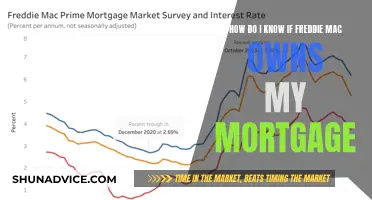
The Mortgage Electronic Registration System (MERS) is an online database that tracks the servicing rights and ownership interests of residential and commercial mortgage loans. MERS is designed to simplify the mortgage process by acting as a mortgagee and cutting the expense of recording the transfer of a mortgage from one lender to another. While MERS can save time and recording costs, it has been criticised for making it difficult to identify the current owner of a mortgage. As a homeowner, you can use MERS to find out who owns your mortgage, which may be important if you want to refinance your loan.
| Characteristics | Values |
|---|---|
| Full Form | Mortgage Electronic Registration System |
| Type | Electronic database |
| Purpose | Track servicing rights and ownership interests in loans |
| Users | Homeowners, local governments, free servicers, lenders, municipalities, insurers, mortgage originators, servicers, warehouse lenders, wholesale lenders, retail lenders, document custodians, settlement agents, title companies, investors, county recorders, consumers |
| Benefits | Saves time and recording costs, provides free public access to information about home mortgages |
| Criticism | Makes it difficult to see who is the current owner of a mortgage, challenging to establish a loan owner in some cases |
| Notable Cases | Landmark National Bank v. Kesler, Kristin Bain v. MERS |
What You'll Learn

What is MERS?
MERS stands for Mortgage Electronic Registration System. It is an online mortgage registration system that tracks a home loan's servicing rights and ownership interests. It is an electronic, one-stop site for mortgage documents, such as deeds of trust and promissory notes.
MERS was developed in the 1990s by the mortgage banking industry to track servicing rights on mortgages. It is used by mortgage originators, servicers, warehouse lenders, wholesale lenders, retail lenders, document custodians, settlement agents, title companies, insurers, investors, county recorders, and consumers.
MERS simplifies the mortgage process by acting as a mortgagee, cutting the expense of recording the transfer of a mortgage from one lender to another. Having the loan in MERS' name (as nominee) in the land records saves time and recording costs because multiple assignments aren't necessary each time the loan changes hands.
MERS is a private database that provides free public access to information about home mortgages. Every loan in MERS is assigned a mortgage identification number (MIN) that stays the same throughout the loan's life, making it easier to track in the system, even if the loan is sold to another financial institution.
While MERS can save time and recording costs, it has been criticised for making it difficult to identify the current owner of a mortgage. During the 2008 housing crisis, the system made it challenging at times to determine who actually owned mortgages. This created issues for homeowners facing foreclosure or seeking relief from their loans, as they needed to know who held their mortgages to find a remedy.
Locating Your HSBC Mortgage Account: A Quick Guide
You may want to see also

How do I find out if I have a MERS mortgage?
The Mortgage Electronic Registration System (MERS) is an online system that tracks a home loan's servicing rights and ownership interests. It is an electronic, one-stop site for mortgage documents, such as deeds of trust and promissory notes. MERS simplifies the mortgage process by acting as a mortgagee, cutting the expense of recording the transfer of a mortgage from one lender to another.
MERS is a private database that facilitates the tracking of mortgages and any ownership changes. It is designed to track servicing rights and ownership of mortgages in the United States. Lenders and borrowers can use the system to see who owns a mortgage.
Each loan in MERS is assigned a unique Mortgage Identification Number (MIN) that remains the same throughout the loan's life, making it easier to track in the system, even if the loan is sold to another financial institution.
To find out if you have a MERS mortgage, you can:
- Call or send a written request to your mortgage servicer.
- Check the Fannie Mae and Freddie Mac websites.
- Check the MERS system directly, as it is a unified database.
Finding Your Wells Fargo Mortgage Balance: A Guide
You may want to see also

What are the pros and cons of a MERS mortgage?
The Mortgage Electronic Registration System (MERS) is an online database that tracks home loan servicing rights and ownership interests. It is designed to simplify the process of transferring mortgage ownership and servicing, eliminating the need to record changes in ownership at the county level. This can save time and money for both lenders and borrowers.
Pros:
- Time and cost savings: MERS reduces the need for repeated assignments and recording fees, lowering the overall cost of the mortgage for consumers. It streamlines the mortgage process, leading to faster transactions and potentially quicker loan modifications or refinances.
- Simplified mortgage ownership tracking: MERS makes it easier for borrowers to find out who owns their loan, providing transparency and assisting in situations like refinancing or selling a house.
- Convenience: MERS provides a single destination for loan information, making it a good starting point for homeowners and lenders to find out who holds a mortgage.
Cons:
- Confusion for homeowners: MERS being named as a beneficiary or mortgagee may confuse borrowers, who might overestimate MERS's role in their home loan.
- Challenges in establishing loan ownership: In the case of MOM (MERS as Original Mortgagee) loans, it could be challenging to identify the current loan owner as MERS is listed as the loan owner on paper.
- Potential lack of transparency: Some consumers may feel that MERS lacks transparency as it separates mortgage ownership from local county records, making it difficult to trace the actual owner of the mortgage.
- Legal challenges: There have been legal controversies surrounding MERS's standing in foreclosure proceedings, creating uncertainty for borrowers.
Understanding Mortgage Affordability: A Guide to Homeownership
You may want to see also

How does MERS impact me as a homeowner?
The Mortgage Electronic Registration System (MERS) is an online database that tracks a home loan's servicing rights and ownership interests. It is an electronic, one-stop site for mortgage documents, including deeds of trust and promissory notes. MERS was established in the 1990s by the mortgage banking industry to simplify the process of transferring mortgage ownership and servicing.
As a homeowner, MERS may have little impact on you or your mortgage. You will still make your monthly payments to your lender or servicer, and MERS will not affect this process. However, MERS can be a useful tool to help you find out who owns your mortgage. This information may be necessary if you want to refinance your house, modify your loan, or update information about your homeowners' insurance.
MERS can act as a cost-saving measure by cutting the expense of recording the transfer of a mortgage from one lender to another. By acting as a mortgagee, MERS eliminates the need for separate assignments each time a loan changes hands. This saves time and recording costs for lenders and can potentially lower the overall cost of originating the mortgage for consumers.
However, MERS has also drawn criticism for making it difficult to see who the current owner of a mortgage is. During the 2008 housing crisis, the system made it challenging for homeowners facing foreclosure or seeking relief from their loans, as they needed to know who held their mortgages to find a solution. Additionally, some consumers may feel that MERS lacks transparency because it separates mortgage ownership from local county records. This can make it difficult to trace the actual owner of the mortgage and has led to legal challenges and controversies surrounding MERS's standing in foreclosure proceedings.
Recognizing Your HARP Mortgage: What You Need to Know
You may want to see also

What is a MOM loan?
A MOM loan is a mortgage loan where the Mortgage Electronic Registration System (MERS) is acting as the mortgagee or beneficiary. MOM stands for "MERS as Original Mortgagee". In this type of loan, MERS is listed as the mortgagee or beneficiary, but it does not own the loan debt or collect monthly payments. Instead, it acts as a nominee for the originator of the loan and its successors and assigns. This means that MERS can act on behalf of the loan holder and eliminates the need for separate assignments each time the loan is sold or transferred.
MOM loans are designed to streamline the process of recording and tracking loans as they are made and sold. By having MERS as the mortgagee, lenders can save time and recording costs, as they don't have to submit new assignments every time the loan changes hands. This is because MERS is an electronic, one-stop site for mortgage documents that tracks servicing rights and ownership interests in loans. It provides free public access to information about home mortgages.
While MOM loans can make it more difficult to track the current loan owner, they do not impact the borrower's monthly payments, which are still sent to the lender or servicer. Additionally, MERS cannot be a party to start foreclosure proceedings, even if it is named as the beneficiary. If a MOM loan goes into foreclosure, MERS would typically assign the loan back to the current owner.
As a homeowner with a MOM loan, you may never need to interact with MERS directly. However, it can be useful to know who the holder of your loan is, especially if you want to refinance or modify your mortgage under certain government programs, such as those offered by Fannie Mae and Freddie Mac.
Who Owns My Mortgage? Finding Your Mortgage Investor
You may want to see also
Frequently asked questions
MERS stands for Mortgage Electronic Registration System. It is an electronic database that tracks servicing rights and ownership interests in residential and commercial mortgage loans.
MERS simplifies the mortgage process by acting as a mortgagee, cutting the expense of recording the transfer of a mortgage from one lender to another. It saves time and recording costs by eliminating the need for separate assignments each time the loan changes hands.
MERS is used by mortgage originators, servicers, lenders, insurers, investors, and consumers. It provides free public access to information about home mortgages.
You can check if you have a MERS mortgage by looking up your mortgagee on the MERS system or by checking the Fannie Mae and Freddie Mac websites. Every loan in MERS is assigned a unique Mortgage Identification Number (MIN) that stays the same throughout the loan's life.
MERS itself does not own any loan debt and it does not impact your monthly mortgage payments. You will still send payments to your lender or servicer. However, MERS may be listed as a mortgagee for convenience, acting on behalf of the loan holder.







